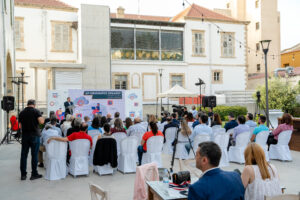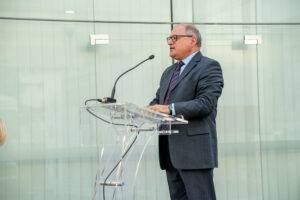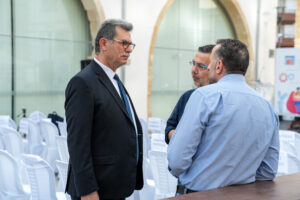The launch of the Hackathon for Skills took place in Larnaka under the auspices of the Ministry of Education, Sports and Youth and the Ministry of Labour, Welfare and Social Insurance.
The hackathon will be jointly organised online and in Malta by the Malta College of Arts, Science, and Technology (MCAST), the National Skills Council, the EUPA and the Western Regional Council. The partners in Cyprus are the Foundation for the Management of European Lifelong learning (IDEP), the Union of Cyprus Municipalities (UCM) and the Cyprus Human Resources Development Authority (ANAD).

The aim of the hackathon is to give 40 young people the chance to compete on the best ideas on career paths over the next decade, on ideas needed in upskilling and reskilling according to industry needs as well as how learning institutions can meet the challenges of skills needs in an age of artificial intelligence and new internet discoveries.
The Maltese delegation in Cyprus was composed of MCAST Principal and CEO Professor Joachim James Calleja, the Executive Chairman of the National Skills Council Dr Jeffrey Pullicino Orlando, Ms Amanda Cassar, Manager Transition MCAST, Mr Raymond Schembri, Mayor of Dingli, Ms Elke Sghendo Deputy Executive of the Western Regional Council and Ritianne Giorgino Executive Secretary Siggiewi Local Council.

A competition will shortly be launched to select 20 Maltese participants between the ages of 18 to 30 who will be organised in four groups to compete for the best ideas on reskilling, upskilling and new skills for jobs in the making. the winners will receive prices. The face-to-face competition will be held at MCAST’s Institute of Engineering and Transport (IET) in November 2023.
In his speech Professor Calleja stressed the importance of training provision for skills needed in the jobs of today and those of tomorrow. He said, “Whereas for knowledge proliferation technology is superior to any form of formal education; whereas for competence employers can lead the process, in skills, training institutions are expected to deliver relevant practice that makes young and older persons employable”.
Skills are in constant change as a result of technological developments in all sectors. It is therefore paramount to listen to young people’s ideas on how they feel about their learning in formal education that leads to skill sets that make them employable. The challenges in today’s learning environments are those related to learners’ engagement, retention as well as participation in the student’s life on campus. “It is for this reason” Professor Calleja said, “that we wish to engage young people in a dialogue among themselves to share with adults mostly born in the 20th century, how they view their education and training that leads to the acquisition of relevant skills “.

Following keynote addresses Dr Jeffrey Pullicino Orlando and Elke Sghendo participated in a panel discussion with Cypriot counterparts on skills for the jobs of the future.







 MCAST Main Campus
MCAST Main Campus  +356 2398 7100
+356 2398 7100
 information@mcast.edu.mt
information@mcast.edu.mt